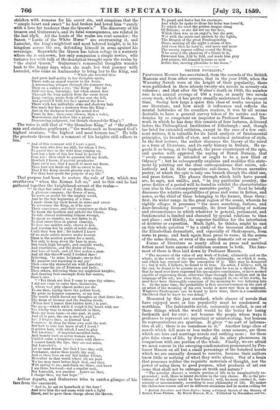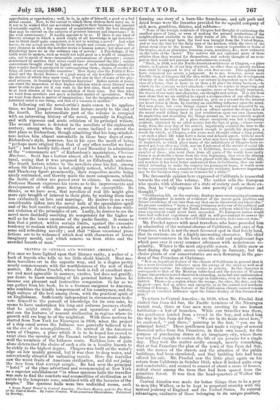BRITISH NOVELISTS. * PROFESSOR MASSON has ascertained, from the records of
the British Museum and from other sources, that in the year 1820, when the Waverley Novels were at the height of their popularity, there were,published in these islands twenty-six novels in seventy-six volumes ; and that after Sir Walter's death in 1830, the number rose to an annual average of 100 ayear, or nearly two novels every week, which it has pretty steadily maintained to the present time. Seeing how large a space this class of works occupies in our literature, and how much it influences and reflects the mental habitudes of its countless readers, it was by all means desirable to have a general survey taken of its nature and ten- dencies by so competent an inspector as Professor Masson. The work in which he has done this consists of four lectures, delivered before the Philosophical Institution of Edinburgh ; and, though too brief for extended criticism, except in the case of a few emi- nent writers, it is valuable for its lucid analysis of fundamental principles, its breadth of view, and sustained animation of style. In the first lecture, the author discusses the theory of the novel as a form of literature, and its early history in Britain. He re- gards it as being, at its highest, the prose counterpart of the epic, and quotes with approval the saying of Baron Bunsen, that " every romance is intended or ought to be a new Iliad or Odyssey" ; but he subsequently explains and modifies this state- ment by pointing out the close correspondence that exists col- lectively and in their respective sub-forms, between narrative poetry, of which the epic is only one branch though the chief one and prose fiction. The phases through which both have passed, are, he says, not unlike, and, " in any particular country, the prose fiction of a period will be found to exhibit the characteristics seen also in the contemporary narrative poetry." Next he briefly discusses the relative capabilities of prose and verse in fiction, and notes, as the chief of those belonging to the former, these three : first, its wider range-, in the great region of the comic, wherein he rightly alleges it possesses " the more searching, furious, and door-breaking licence" ; secondly, its freer handling of notions and circumstances in which whatever is general, permanent, and fundamental is limited and obscured by special relations to time and place ; and thirdly, its superior facilities for the interfusion of doctrine or exposition. Much light, he thinks, might be cast on this whole question " by a study of the incessant shiftings of the Elizabethan dramatists, and especially of Shakespeare, from verse to prose, and back again from prose to verse, in the course of the same drama, or even of the same dramatic act or scene."
Forms of literature so nearly allied as prose and metrical fiction must have canons of criticism common to both. The fore- most of these is thus laid down by Professor Masson.
"The measure of the value of any work of fiction, ultimately and on the whole, is the worth of the speculation, the philosophy, on which it rests, and which has entered into the conception of it. This may be demurred to ; but it will, I believe, be found to be true. No artist, I believe, will is the end, be found to be greater as an artist than he was as a thinker. Not that he need ever have expressed his speculative conclusions, or have seemed capable of expressing them, otherwise than through the medium and in the language of his art; nor even that, while engaged in one of his works, he need have been thoroughly conscious of the meaning he was infusing into it. At the same time, the probability is that unconsciousness on the part of an artist of the meaning of his own works is more rare than is supposed. Whatever Shakespeare can be found to have done, there is a considerable likelihood that he knew he was doing."
Measured by this just standard, whole classes of novels that have enjoyed more or less popularity must be condemned as worthless. The fashionable novel, commonly so called, is one of those things which the world would be the better for losing forthwith and for ever ; not because the people whose ways it professes to represent are important or uninteresting, but because its representations are spurious. It gives " no sort of informa- tion at all ; there is no soundness in it." Another large class of novels which fall more or less under the same censure, are those which are love and marriage novels and nothing more ; for these give false views of life, by dwarfing all its other phenomena in comparison with one portion of the whole. Finally, we are afraid we must concur in the sweeping condemnation pronounced by Pro- fessor Masson on all but a small percentage of the hundred novels which we are annually doomed to receive, because their authors know little or nothing of what they write about. Out of a brain that possesses neither the requisite materials of thought, nor the power of using them to good purpose, what products of art can come that shall not be outrages on truth and nature ?
" The novelist chooses a certain portion of life to be imaginatively re- presented ; well, there is latent doctrine in the very choice. He is the pro- vidence of the mimic world he has framed ; well, he must conduct it, con- sciously or unconsciously, according to some philosophy of life. He makes his characters reason and act in different situations and in modes calling for • British Novelists and their Styles : being a Critical Sketch of the History of British Prose Fiction. By David Masson, M.A. Published by Macmillan and Co. approbation or reprobation ; well, he is, in spite of himself, a good or a bad moral casuist. Now, to the extent to which these obvious facts carry us, is it not to be wished that our novelists brought to their businessa fair amount of scientific capital, a fair amount of acquaintance with the best thoughts that may be current on the subjects of greatest interest and importance ? Is the wish unnecessary? It hardly appears to be so. If there is any kind of literary attempt to which a mind empty of all knowledge is apt neverthe- less to think itself quite competent, is it not to writing a novel ? And what havoc, in our actual novels, of the most simple and certain principles! The very element in which the novelist works is human nature; yet what sort of Psychology have we in the ordinary run of novels ? A Psychology, if the truth must be spoken, such as would not hold good in a world of imaginary cats, not to speak of men—impossible conformations of character ; actions determined by motives that never could have determined the like ; sudden conversions brought about by logical means of such astounding simplicity that wonder itself is paralyzed in contemplating them ; chains of events de- fying all laws of conceivable causation!! How shaky also the Political Eco- nomy and the Social Science of a good many of our novelists—sciences in the matter of which they must work, if not also in that of some of the phy- sical sciences, in framing their fictitious histories ! Before novels or poems can stand the inspection of that higher criticism which every literary work must be able to pass ere it can rank in the first class, their authors must be at least abreast of the beat speculation of their time. Not that what we want from novelists and poets is further matter of speculation. What we want from them is matter of imagination ; but the imagination of a well furnished mind is one thing, and that of a vacuum is another."
In following out the novel-critic's main canon to its applica- tions, we have jumped from his first lecture nearly to the end of the fourth. The intermediate part of the volume is occupied with an interesting history of the novel, especially in England, and with vigorous and acute criticism of its principal writers. The second lecture is devoted to the novelists of the eighteenth century, among whom the writer seems inclined to award the first place to Richardson, though admitting that his long-winded- ness makes him almost unreadable in these busy days of ours. Richardson's style, however, has in his eyes the merit of being "perhaps more original than that of any other novelist we have had" ; and he hardly falls short of Lord Macaulay in admiration of the "consummate art" of Richardson's masterpiece, Clarissa Ilarlowe. Scott has a lecture almost all to himself, as was na- tural, seeing that it was prepared for an Edinburgh audience. The fourth lecture relates to the novelists since his day, among whom Sir Bulwer Lytton is but slightly noticed, whilst Dickens and Thackeray figure prominently, their respective merits being nicely contrasted, and thereby made the more conspicuous, whilst the faults of either are passed over in silence. In conclusion, Professor Masson expresses his views as to the improvements and developments of which prose fiction may be susceptible. He thinks, as we have seen, that novelists of real life might give more epic breath of interest to their plots, by making them turn less exclusively on love and marriage. He desires to see a very considerable i,iiaflux into the novel both of the speculative spirit and of the best results of speculation, provided this be done with- out violation of the principles of art. Lastly, he desires to see the novel more decidedly asserting its competency for the higher as well as for the lower exercise of the poetic faculty. It seems to him that a protest, within certain limits, against the excessive tendency to realism which prevails at present, would be a whole- some and refreshing novelty ; and that " those occasional prose fictions are to be welcomed which deal with characters of heroic imaginary mould, and which remove us from cities and the crowded haunts of men."



























 Previous page
Previous page